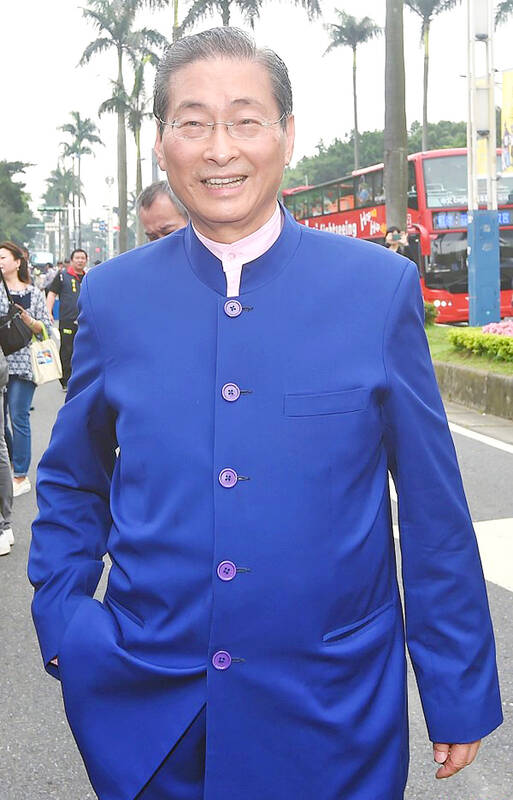Prosecutors have launched an investigation into Chang An-lo (張安樂), better known as the “White Wolf” (白狼), alleging he heads a Chinese gang working with Mexican drug cartels to produce and distribute fentanyl in the US.
It came after an interview by US author Peter Schweizer, talking about his book on the opioid epidemic in the US, Blood Money: Why the Powerful Turn a Blind Eye While China Kills Americans, published in February last year.
Supreme Prosecutors’ Office spokesman Wu Yi-ming (吳怡明) in a statement on Wednesday said that the Taiwan High Prosecutors’ Office would conduct an investigation, “following reports in US and Taiwanese media alleging Chang An-lo, the ‘White Wolf,’ is leading his Bamboo Union gang to assist Mexico’s Sinaloa cartel in the fentanyl drug trade.”

Photo: Wang Ting-chuan, Taipei Times
Schweizer alleged that Chang and the Bamboo Union gang are producing and trafficking fentanyl in the US.
Chang is a well-known public figure who, together with Chen Chi-li (陳啟禮), or the “King Duck” (鴨霸子), founded the Bamboo Union gang, a criminal syndicate mainly consisting of people who fled with the Chinese Nationalist Party (KMT) regime to Taiwan in late 1940s following the Chinese Communist Party’s victory in the Chinese Civil War.
Born in Nanjing, Chang has been active in politics after founding the China Unification Promotion Party, known for its pro-China stance and clashes with pro-Taiwan independence groups.
Chang left Taiwan to study in the US in 1975 and was allegedly connected to the 1984 murder of Taiwanese writer Henry Liu (劉宜良) in California when Chang operated a restaurant in Los Angeles, which served as a base for organizing the Bamboo Union gang activities in US, such as debt-collecting and intimidation.
Chang in 1985 was convicted of trafficking heroine and cocaine and handed a 15-year prison sentence. He was paroled after serving 10 years.
Chang returned to Taiwan in 1995, but fled to China the next year and stayed there until 2013.
Schweizer said that the opioid epidemic had resulted in many deaths in the US, pointing to the roles of Chinese Communist Party propaganda and covert operations to influence the social justice movement and medical establishment to sow chaos in the US.
He wrote that during former US president Joe Biden’s term, Biden and his family members had received millions of dollars from Chinese oil tycoon Ye Jianming (葉簡明), who set up a petroleum company with a business partner, who Schweizer said was a drug lord known as the “White Wolf” who heads the Bamboo Union gang.
The gang also “has a partnership with Mexico’s Sinaloa cartel and helps them in the production and distribution of fentanyl in the US,” Schweizer said, adding that the gang was pivotal in turning the Sinaloa cartel into the “Kings of Fentanyl.”
He also wrote that the White Wolf has close ties with the Chinese government and that senior Chinese Communist Party officials call him “Big Brother.”
He said that the gang has been involved in the international drug trade for decades, and is one of leading Chinese gangs active in US cities with large Chinese diaspora populations, such as Los Angeles, San Francisco, Honolulu, Chicago, Houston, Miami and Phoenix.
The gang has built up a sophisticated US network capable of supplying members with guns, narcotics and fraudulent identity papers to operate internationally.
It has been cooperating with Mexico’s Sinaloa cartel to traffick fentanyl into the US, resulting in the deaths of many Americans, Schweizer said.

Taiwanese can file complaints with the Tourism Administration to report travel agencies if their activities caused termination of a person’s citizenship, Mainland Affairs Council Minister Chiu Chui-cheng (邱垂正) said yesterday, after a podcaster highlighted a case in which a person’s citizenship was canceled for receiving a single-use Chinese passport to enter Russia. The council is aware of incidents in which people who signed up through Chinese travel agencies for tours of Russia were told they could obtain Russian visas and fast-track border clearance, Chiu told reporters on the sidelines of an event in Taipei. However, the travel agencies actually applied

New measures aimed at making Taiwan more attractive to foreign professionals came into effect this month, the National Development Council said yesterday. Among the changes, international students at Taiwanese universities would be able to work in Taiwan without a work permit in the two years after they graduate, explainer materials provided by the council said. In addition, foreign nationals who graduated from one of the world’s top 200 universities within the past five years can also apply for a two-year open work permit. Previously, those graduates would have needed to apply for a work permit using point-based criteria or have a Taiwanese company

The Shilin District Prosecutors’ Office yesterday indicted two Taiwanese and issued a wanted notice for Pete Liu (劉作虎), founder of Shenzhen-based smartphone manufacturer OnePlus Technology Co (萬普拉斯科技), for allegedly contravening the Act Governing Relations Between the People of the Taiwan Area and the Mainland Area (臺灣地區與大陸地區人民關係條例) by poaching 70 engineers in Taiwan. Liu allegedly traveled to Taiwan at the end of 2014 and met with a Taiwanese man surnamed Lin (林) to discuss establishing a mobile software research and development (R&D) team in Taiwan, prosecutors said. Without approval from the government, Lin, following Liu’s instructions, recruited more than 70 software

Chinese spouse and influencer Guan Guan’s (關關) residency permit has been revoked for repeatedly posting pro-China videos that threaten national security, the National Immigration Agency confirmed today. Guan Guan has said many controversial statements in her videos posted to Douyin (抖音), including “the red flag will soon be painted all over Taiwan” and “Taiwan is an inseparable part of China,” and expressing hope for expedited reunification. The agency last year received multiple reports alleging that Guan Guan had advocated for armed reunification. After verifying the reports, the agency last month issued a notice requiring her to appear and explain her actions. Guan